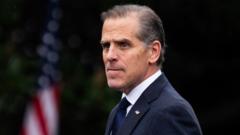President Trump's ambitious tax bill encountered a major setback when five Republicans joined Democrats in opposing it, demanding further cuts to Medicaid. The proposed legislation, aimed at extending tax cuts from Trump's first term, faces challenges within the party as some members call for stricter budget reforms.
Tensions Rise as House Republicans Rebel Against Trump's Tax Bill

Tensions Rise as House Republicans Rebel Against Trump's Tax Bill
Five Republican lawmakers oppose President Trump's significant tax proposal, citing the need for deeper budget cuts and raising concerns about Medicaid.
In a surprising turn of events, President Donald Trump's highly anticipated tax bill, referred to as the "big, beautiful bill," met significant resistance during a congressional vote on Friday. Five Republican lawmakers sided with Democrats, resulting in a significant blow to the Trump administration's legislative agenda. These dissenting Republicans insist on deeper budget cuts, particularly targeting Medicaid, a critical healthcare program for low-income citizens.
Despite this setback, Trump urged party members to unify in support of the legislation, emphasizing the need for action over divisiveness. "We don't need 'GRANDSTANDERS' in the Republican Party. STOP TALKING, AND GET IT DONE!," he wrote on Truth Social.
Support for the bill among Republicans is fractured, with hard-liners advocating for more stringent cuts, while others worry about potential impacts on vital services such as Medicaid. The dissenting Republicans indicated their refusal to back the bill unless Speaker Mike Johnson agreed to eliminate Medicaid funding cutbacks and repeal the green energy tax credits instated by Democrats. Texas Republican Chip Roy expressed disappointment, stating, "This bill falls profoundly short... it does not do what we say it does with respect to deficits."
While the bill aims to renew tax cuts from Trump's first term and features a no tax on tips provision, critics maintain that it ultimately favors wealthier Americans. Democrats have also voiced their opposition, pushing for reconsideration of Medicaid funding reductions and cuts to vital programs like the Affordable Care Act. Pennsylvania's Brendan Boyle criticized the bill, arguing that no previous legislation had led to more Americans losing healthcare coverage than this proposal would.
According to estimates from Congress's bipartisan Joint Tax Committee, the pending tax changes could result in a staggering $3.72 trillion cost over the next decade, casting a shadow over their viability as the legislative landscape becomes increasingly contentious.



















